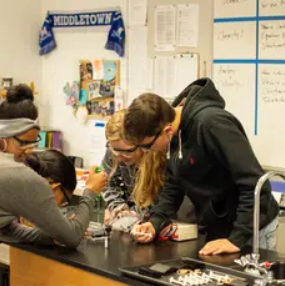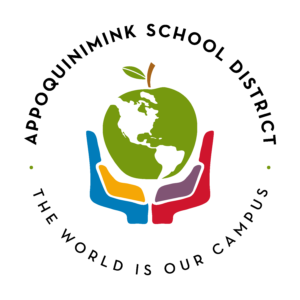
The Project Lead the Way (PLTW) Computer Science program of study is an instructional program that engages students in open ended problem solving where students study computational practices such as algorithm development, problem solving, and programming within the context of problems relevant to their everyday lives. They are also introduced to topics such as interface design, limitations of computers, and societal and ethical issues. The program prepares students for further education and careers in information technology and computer science.
CS405
1 Credit
With an emphasis on computational thinking and collaboration, this course provides an excellent entry point for students to begin or continue the PLTW Computer Science K-12 experience. Computer Science Essentials will expose students to a diverse set of computational thinking concepts, fundamentals, and tools, allowing them to gain understanding and build confidence.
CS400 + 3 College Credits
1 Credit
Using Python® as a primary tool and incorporating multiple platforms and languages for computation, this course aims to develop computational thinking, generate excitement about career paths that utilize computing, and introduce professional tools that foster creativity and collaboration. Computer Science Principles helps students develop programming expertise and explore the workings of the Internet. Projects and problems include app development, visualization of data, cybersecurity, and simulation. Students who successfully complete this course are expected to take the AP Computer Science Principles exam in the Spring.
1 Credit + 3 College Credits
Computer Science A focuses on further developing computational thinking skills through the medium of Android™ App development for mobile platforms. The course utilizes industry-standard tools such as Android Studio, Java™ programming language, XML, and device emulators. Students collaborate to create original solutions to problems of their own choosing by designing and implementing user interfaces and Web-based databases. Students who successfully complete this course are expected to take the AP Computer Science A exam in the spring.
CS505
1 Credit
This course introduces the tools and concepts of cybersecurity and encourages students to create solutions that allow people to share computing resources while protecting privacy. Nationally, computational resources are vulnerable and frequently attacked; in Cybersecurity, students solve problems by understanding and closing these vulnerabilities. This course raises students’ knowledge of and commitment to ethical computing behavior. It also aims to develop students’ skills as consumers, friends, citizens, and employees who can effectively contribute to communities with a dependable cyber-infrastructure that moves and processes information safely. This is the capstone senior year course for students in the Computer Science Pathway.

Course 21006
1 Credit
Engineering Essentials is a full-year course designed to be a high school student’s first exposure to the PLTW Engineering program and is appropriate for students in grades 9-12. In Engineering Essentials, students explore the work of engineers and their role in the design and development of solutions to real-world problems. The course introduces students to engineering concepts that are applicable across multiple engineering disciplines and empowers them to build technical skills through the use of a variety of engineering tools, such as geographic information systems (GIS), 3-D solid modeling software, and prototyping equipment. Students learn and apply the engineering design process to develop mechanical, electronic, process, and logistical solutions to relevant problems across a variety of industry sectors, including health care, public service, and product development and manufacturing.
TE9310
1 Credit
This course emphasizes design and product development. Students use computer software to produce, analyze, and evaluate mathematical models and project solutions. Students study design concepts, such as form and function, then use state-of-the-art technology to translate conceptual design into reproducible products.
*Prerequisite: Algebra I, Engineering Essentials
TE9105
1 Credit
This course provides an overview of engineering and engineering technology. Students develop problem-solving skills by tackling real-world engineering problems through theory and practical hands-on experiences. Students address the emerging social and political consequences of technological change.
*Prerequisite: Intro to Engineering
TE9315
1 Credit + 3 College Credits
This course enables students to apply what they have learned in academic and Engineering courses to complete a challenging and self-directed project. Students work in teams to design and build solutions to authentic engineering problems. An engineer or professional from the school’s partnership team will mentor each student team. Students document all work in an engineering journal and make progress reports to their peers, industry mentors, and instructors. At the end of the course, teams present their research paper and defend their projects to a panel of engineers, business leaders, and faculty from engineering colleges for professional review and feedback. This course equips students with the independent study skills that they will need in post-secondary education and careers in engineering and engineering technology. This is the capstone senior year course for students in the Engineering Pathway.
*Prerequisite: Principles of Engineering

03051(H)
1 Credit
This course uses inquiry-based investigations to explore the relationships within cellular energy systems, cellular structure and function, DNA and genetic influence, evolutionary theory and ecological connections. Students will get experience gathering information to communicate reasoning through formal lab reports and writing to explain systems and models investigated.
0305312 (H)
1 Credit
This course is designed for those interested in the medical field. The course first introduces anatomy and physiology as well as basic terminology and tissues. An overview of chemistry and biology as it relates to the levels of organization is also covered. Next, the course covers the integumentary, skeletal, muscular, and nervous systems; both their structure and function as well as contribution to homeostasis are part of this course. Throughout the course, the students will analyze and collaborate to design a course of action for various case studies. Dissection is required.
*Prerequisite: Biology I
03214
1 Credit
Forensic Science is designed to incorporate the scientific concepts and techniques utilized in the field of forensics. Course units include observational skills, crime scene analysis, evidence gathering and processing, hair, fiber and textile analysis, DNA profiling, fingerprint analysis, blood spatter and forensic anthropology. The course concludes with a death scene investigation that allows students to embody the role of a forensic investigator and ultimately put the skills learned throughout the course into cumulative practice. Evidence-based reasoning is a cornerstone of the course and will be employed using an activity-based approach to frame each curricular unit.
*Prerequisite: Biology I, Chemistry I, Geometry Prerequisite OR concurrent course: Anatomy and Physiology I
03215
1 Credit
Forensic Science II is designed to incorporate the scientific concepts and techniques utilized in the field of forensics. Course units include crime scene analysis, physical/biological evidence gathering and processing, firearms/explosives, toxicology, and communication analysis. The course concludes with a death scene investigation that allows students to embody the role of a forensic investigator and ultimately put the skills learned throughout the course into cumulative practice. Evidence-based reasoning is a cornerstone of the course and will be employed using an activity-based approach to frame each curricular unit. Capturing evidence via photographic or video-graphic means is an essential component of crime scene investigation. As such, students will be required to photo and/or videotape themselves and each other for various assignments and assessments in this course.
*Prerequisite: Forensic Science I

Pathway requirements include the completion of four Science credits, three additional Science elective credits, and the completion of the Scientific Research and Design Capstone Course.
03212
1 CREDIT
The capstone course represents the culmination of the Science Pathway. This course focuses on technical scientific writing, laboratory skills, robust data analysis, and the development and implementation of effective research practices. The final product for the course will be an independent research project on a topic of the student’s choosing. All students will be expected to present their findings as part of the ASD STEM Fair.
*Prerequisite: Students will have completed a minimum of 6 Science credits.

Appoquinimink School District
118 S. Sixth Street
Odessa · DE · 19730
WBL@appo.k12.de.us
apposchooldistrict.com